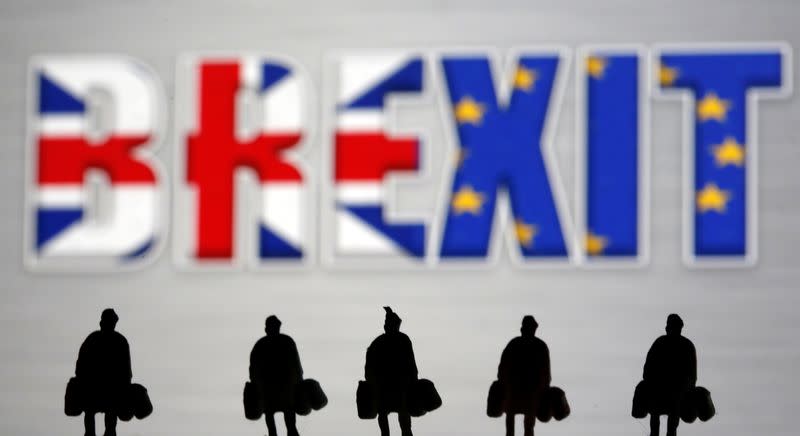With a bit of oomph, Brexit deal feasible in July, says UK's Johnson
By John Chalmers and Elizabeth Piper
BRUSSELS/LONDON (Reuters) - Leaders from Britain and the European Union agreed on Monday that talks on their future relationship should be stepped up to clinch a deal, with Prime Minister Boris Johnson suggesting an agreement could be reached in July with "a bit of oomph".
With a status-quo transition deal set to run out at the end of the year, the two are seeking a free trade agreement. But businesses on both sides are being told to prepare for a no-deal outcome that some fear would complicate trade and hurt jobs.
"I don't think we're actually that far apart but what we need now is to see a bit of oomph in the negotiations," Johnson said, adding that he had told the EU's top representatives that there was a need to "put a tiger in the tank" of the talks.
"The faster we can do this the better, and we see no reason why you shouldn't get this done in July."
Earlier, after a video conference between Johnson, European Commission President Ursula von der Leyen and the leaders of the European Council and European Parliament, the two sides said they "agreed ... that new momentum was required".
Britain left the EU on Jan. 31 and its relationship with the bloc is now governed by a transition arrangement that keeps previous rules in place while the two sides negotiate new terms.
Negotiators have made very little progress towards a trade pact, however, and the talks have all but stalled over issues such as fair-competition guarantees and fishing rights.
London confirmed last week that it had no intention of extending the transition period beyond 2020.
Some fear that, with the two sides so far apart and little time left to negotiate, London's decision not to extend may lead to a cliff edge that could compound the economic damage caused by the coronavirus crisis.
One EU diplomat said that, despite plans to speed up talks, major progress was unlikely until after the summer, when London would "scramble to get something done" at the 11th hour, as it did last year to reach a withdrawal agreement.
Jill Rutter, an expert at the UK in a Changing Europe think-tank, told a Brexit panel discussion on Monday that a "very thin and unambitious deal" was likely, but a no-deal scenario couldn't be ruled out.
"I think it would be totally wrong to think that the UK will be so desperate that it will move heaven and earth to avoid no deal," she said.
(Additional reporting by Estelle Shirbon in London; Writing by John Chalmers; Editing by Catherine Evans)

 Yahoo Finance
Yahoo Finance 

